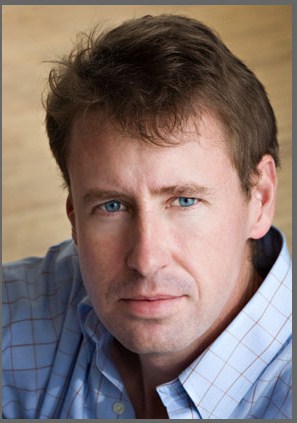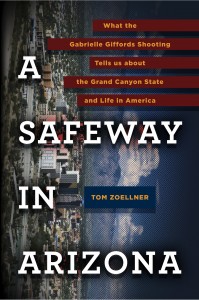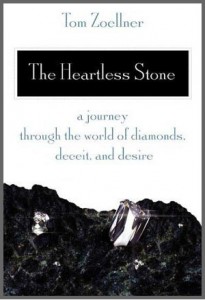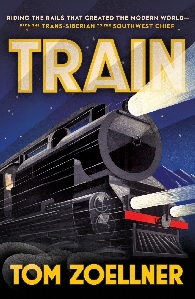There is pretty much no point on the earth author Tom Zoellner won’t go to tell a great story. Although his books cover an expansive range of subjects – from the world-changing impact of Uranium to the  blood-soaked diamond industry (The Heartless Stone) through an epic but wildly entertaining history of the world’s railroad system (Train) – Zoellner makes often complex works accessible and entertaining. He shared some time with The Open Mic recently to talk about his work and the industry.
blood-soaked diamond industry (The Heartless Stone) through an epic but wildly entertaining history of the world’s railroad system (Train) – Zoellner makes often complex works accessible and entertaining. He shared some time with The Open Mic recently to talk about his work and the industry.
OpenMic: You have written some wildly disparate topics, from uranium to diamonds, from trains to how to write a good biography. The common thread is those subjects all seem very personal to you. Is that the main criteria for how you pick a topic?
Zoellner: I look, first and foremost, for a good story – one that I’m going to want to push and pull for at least a year and one with a narrative that has some surprises.

A personal story
OpenMic: You’re book “A Safeway in Arizona” is particularly personal as it is focused on the shooting of U.S. Rep. Gabby Giffords, who is a friend of yours. Were you ever concerned that maybe you were too close to her to be able to cover the story you wanted to tell, which wasn’t just about her shooting but the supercharged political and social environment in which it occurred?
Zoellner: That book was the least-enjoyable writing experience I’ve ever had — not only because two of the victims were my friends, but because the subject material is inherently upsetting and close to home (the violence occurred two miles from where I grew up). The core thesis is also controversial: that the particular culture and geography of 21st century Arizona played a major contributing factor in the incident.
OpenMic: Your books have taken you all over the world. Is there one event or place that stands out for you more than others?
Zoellner: I will never forget my first time in sub-Saharan Africa — in this case, the Central African Republic, an unhappy post-colonial chunk of France’s former domains. Nothing prepares you for the full-on experience of a nation utterly neglected and cast aside.

Heartless, indeed.
OpenMic: Your book “The Heartless Stone” lays out the cold-blooded world of the diamond industry. Some of the places you went to and the people you interviewed seem pretty dangerous. Were you ever in danger doing that work?
Zoellner: Not in any serious way, though there were a few medium-dicey situations.
OpenMic: Nonfiction requires so much research. What is your process for taking a book from start to finish? All research and then write, write as you go, etc.?
Zoellner: Write as you go – take the trip, makes notes like a madman, sketch out the chapter on return and then say it as best you can.
OpenMic: A topic like diamond production or uranium could easily become bogged down in scientific minutia, but you are well known for making these potentially difficult subjects very accessible. Is there a process that you follow in that regard?
Zoellner: I struggle through the science by trying to explain it to myself. Metaphors can help. Then I try to translate my own journey of comprehension to the page. And I always run my translated version past an expert or three before calling it done.

A living symbol of sex, death, fear and romance.
OpenMic: Which of your books has been the most challenging for you? Why? Conversely, which has been the most rewarding?
Zoellner: “A Safeway in Arizona” was by far the worst. “Train” was the most fun, in terms of the travel and the people.
OpenMic: Non-fiction is so dependent on the writer’s platform these days. We of course want a nonfiction writer to know what they are talking about, but it seems like there is perhaps too much emphasis on that one element. What advice do you have for non-fiction writers who might have a good idea but not quite the platform?
Zoellner: I’m not a believer in the “platform” concept in narrative nonfiction — that always seemed like a lazy financial guarantee for the benefit of agents. A real writer doesn’t waste any time thinking about such a ridiculous prerequisite; they’re going to care about ideas and the craftsmanship of the writing. The simple truth is that a smart idea expressed in vivid language is going to triumph over a Twitter headcount any day.
OpenMic: Who are your literary inspirations? Who do you read these days?
Zoellner: I’m now reading a terrific book called “The Apostles: Travels Among the Tombs of the Twelve,” by Tom Bissell. Biblical scholarship mingled with enlightening travel stories.
OpenMic: Is there anything you can’t live without as a writer?
Zoellner: Time and quiet.
OpenMic: What is the biggest mistake you have made as a writer?
Zoellner: Thinking that I couldn’t do it, or that I wasn’t the right person. There will never be a perfect time. You just have to hold your nose and jump into the pool.
OpenMic: How do you see the publishing industry these days?
Zoellner: With great optimism. Technology is always going to change. The habit of reading remains as strong as it ever was, and great ideas will always find their audience.
